
English (965)
Children categories
Partnership between NetCom Learning & BRAC USA Sets Goal of Opening Over Thirty Preprimary Schools
26 March 2013, New York. Celebrate the Love of Learning Program with NetCom Learning as we partner with BRAC USA to bring education around the world.
NetCom Learning and BRAC USA are partnering in NetCom Learning's Love of Learning program to provide education for children in disadvantaged communities around the world. The Love of Learning, which is part of the nationwide Learning Movement, was created by Russell Sarder, the CEO of NetCom Learning, who is originally from Bangladesh. NetCom Learning has long had as its aim to promote the values of lifelong learning as part of its corporate social responsibility initiative. To create this program NetCom Learning is partnering with BRAC USA, a nonprofit organization that works to help individuals create better futures for themselves and for the communities in which they live. NetCom Learning and BRAC USA expect to be able to raise funds to open more than thirty new preprimary schools for children in the next few months thanks to clients and partners in the Love of Learning program.
The Love of Learning is tied to class registrations at NetCom Learning. For every technical course registration that occurs with a prepaid price of $2,000 or more NetCom Learning contributes funding for a child's education for a year in a developing country. NetCom Learning is an innovative leader in IT, business and executive training to companies, individuals, and government agencies. The organization offers over 1,000 training courses from more than 20 vendors such as Microsoft, CompTIA, CISCO, PMI, Autodesk, and more.In this way, by registering for a training course, NetCom Learning students not only become certified in their fields, they will gain powerful knowledge they need for their job but more importantly they are contributing to the future of a child around the world.
"NetCom Learning would like to invite everyone to join with us in promoting and celebrating this Love of Learning initiative," said Russell Sarder, CEO of NetCom Learning. "Our purpose is to promote lifelong learning around the world, and every student that signs up for a class is helping us to make this possible. We want to get everyone educated and on the road to lifelong learning," said Sarder.
Love of Learning
The Love of Learning Program is a recent initiative of NetCom Learning working in tandem with BRAC USA. The program is funded by NetCom Learning donations based on the number of prepaid class registrations. The program was created by NetCom Learning's CEO Russell Sarder for whom the promotion of learning is a passion. The promotion of lifelong learning guides company actions on a daily basis. As Russell Sarder puts it,"Promoting the values of lifelong learning is not a marketing gimmick, it is part of our DNA, it is how we we operate the business on a daily basis." The success of the Love of Learning Program over such a short period of time is a testament to the the success of the company and the overwhelming desire to promote education. Russell chose to accomplish this goal with BRAC USA due to its commitment to helping individuals around the world through education and other programs. Susan Davis, CEO of BRAC USA recently participated in the nationwide Learning Movement through an interview for Sarder TV, a collection of videos with top industry and educational experts who discuss the importance of learning, and the methodology for personal and organizational success.
What is BRAC?
BRAC, a development organization founded in Bangladesh in 1972, is a global leader in creating opportunities at scale as a means to end poverty. With more than 100,000 employees, it is the world's largest nongovernmental organization, touching the lives of an estimated 126 million in 11 countries using a wide array of antipoverty tools such as microfinance, education, healthcare, legal rights training and more. BRAC USA is a US affiliate created in 2007 to advance and support BRAC's global mission.For more information on NetCom Learning's Love of Learning program, visit: http://mkt.netcomlearning.com/LoveofLearning.html
About NetCom Learning
NetCom Learning is an innovative leader in IT, business and executive training to companies, individuals, and government agencies. Since its inception in 1998, NetCom Learning has trained over 80 percent of the Fortune 100, serviced over 45,500 business customers, and advanced the skills of more than 71,000 professionals through hands-on, expert-led training, with the organization maintaining an average instructor evaluation score of 8.6 out of 9. NetCom Learning was recognized by Microsoft Corporation as its Worldwide Training Partner of the Year and named thrice to Inc. Magazine's list of fastest growing private companies in America. The organization was also recently named to the 2012 Top 20 IT Training Company by TrainingIndustry.com and was named "Company of the Year" by the American Business Awards.
The purpose of NetCom Learning is to promote the values of lifelong learning
Contact:
Marketing Manager
NetCom Learning
20 West 33rd Street
4th Floor
New York, NY 10001
Phone: (212) 629-7265
Fax: (212) 947-5462
This email address is being protected from spambots. You need JavaScript enabled to view it.
BRAC Liberia launches ‘Poultry Hatchery and Feed Mill Project’ in Buchanan

24 March 2013, Dhaka. BRAC Liberia successfully launched a poultry programme, Poultry Hatchery and Feed Mill Project, in Neekreen, Buchanan, GrandBassa County on March 1, 2013. The groundbreaking project, the first hatchery and feed mill since the civil war, engages 40 staff and 200 community livestock and poultry promoters, and will directly benefit 300 farmers.
In his speech, BRAC Liberia's country representative, Mohammed Abdus Salam said that BRAC identified the absence of poultry feed in Liberia which is essential to develop the poultry sector in the country. Considering a growing demand for this, BRAC in collaboration with Chevron, setup the unique project. In addition to helping the farmers, the project will also create employment opportunities and strengthen the poultry sector. Mr. Salam thanked Chevron and the European Union for their contribution to the food security project and commended their partnership in further expansion of the poultry farm feed mill.
Madam Etweda Cooper, the Grand Bassa County Superintendent, remarked that the project was a great milestone for the county's citizens and will go a long way in bringing much needed development. She praised BRAC Liberia for its contribution in establishing the first hatchery and feed mill after the devastating war in Liberia and expressed her willingness to work closely with BRAC Liberia, Chevron Liberia Limited and European Union. She also called on the residents of the district to help sustain the project and work hard to reap benefits from it.
Chevron's country manager, Karl Cottrell expressed his optimism that the project will expand outside of the county so that Liberians do not have to buy chicken and other poultry product from Europe and other West African countries. He envisions that the project will reach more than 3,000 beneficiaries in the near future, with significant improvements in the next five years. Mr. Cottrell underscored the need for continuous partnership between BRAC, Chevron and the Ministry of Agriculture in bringing sustainable growth in Liberia.
Dr. Sizi Z. Subah, the Deputy Minister of Agriculture, emphasised on the ministry's commitment in attaining food security, and called on the Liberians to elevate themselves to the condition where chicken and poultry products are not only delicacies of the holidays. He further pledged his Ministry‘s unwavering support in assisting BRAC to successfully complete the poultry hatchery and feed mill project in the Grand Bassa county.
James B. Logan, the former Deputy Minister of Agriculture, who initially worked with BRAC during the project's planning stage, urged the resident of the area to embrace and engage in the project so that the beneficiaries are able to maximise their return.
The citizens of the district echoed the optimism of the speakers, and expressed their gratefulness and commitment in making the project successful.
Brandeis University, USA announces graduate scholarship in honor of Sir Fazle Hasan Abed
Brandeis University in USA has announced “The Bangladesh Poverty Reduction and Sustainable Development Scholarship for the Masters of Arts in Sustainable international development for early-to-mid career development practitioner within BRAC. This scholarship honors the continuing work of Sir Fazle Hasan Abed, Founder and Chairperson of BRAC.
The scholarship will begin in late August 2013.
This competition is open to all BRAC staff worldwide.
The Scholarship valued at over US $48,000 includes:
- Full tuition and fees for the year-in-residence at Brandeis, and all university fees for the second year field project.
- One round trip airfare from Bangladesh
- Several partial tuition scholarships may be awarded to runner-up candidates
Health insurance and living expenses are not included
See website for cost estimate: http://heller.brandeis.edu/admissions/financial-aid-info/cost.html
APPLICATION DEADLINE: MAY 1, 2013
Applicants may apply online identifying their interest in the BRAC scholarship. Full application detail can be found at http://heller.brandeis.edu/academic/sid/admissions/ma-requirements.html
For application questions contact:
Jamie McCarthy
Assistant Director
Heller Admissions
E: This email address is being protected from spambots. You need JavaScript enabled to view it.
For further information on the degree program, please contact:
Faria Zaman
Assitant Director for the International recruitment
Graduate Programs in Sustainable International Development and Health
E: This email address is being protected from spambots. You need JavaScript enabled to view it.
Download the flyer for more details
Training Workshop on Research Proposal Preparation and Scientific Report Writing
18 February 2013, Dhaka. A training workshop on Research Proposal Preparation and Scientific Report Writing was held at BCDM, Rajendrapur, Gazipur from February 9 to 13, 2013. The workshop was organized by Krishi Gobeshona Foundation in collaboration with BRAC. 30 scientists from different fields of National Agricultural Research Systems (NARS) institutes participated in the five-day long workshop that aimed to improve the scientific research skill for writing/preparing quality research project proposal and report writing.
The workshop was directed to fill the need of the researchers to prepare formal research proposals for securing funds from different sources and to write reports for publishing paper in scientific journals. The researchers in Bangladesh, though academically qualified, are often not well versed in the art of research project proposal and report writing which requires adequate relevant scientific knowledge and skill. The meticulously designed training workshop with focused activities and facilitation of specialist resource speakers served to improve the necessary skill of the researchers.
The distinguished resource persons of the workshop included Dr. Francisco Javier Zapata-Arias, Advisor, Agriculture and Food Security Programme, BRAC; Andrew Jenkins, Coordinator, Impact Assessment Unit, Research and Evaluation Division (RED), BRAC; Fakir Md. Yunus, Research Associate, Impact Assessment Unit, RED; S M Mustafizur Rahman, Faculty Member, BRAC Learning Division (BLD); A.K.M. Alamgir Chowdhury, Director, Socioconsult; Hasan Shareef Ahmed, Chief of Editing and Publication, RED; Jan Jenkins, education specialist and Nil Ratan Halder, Senior Program Manager, BRAC Education Programme (BEP). Among the participants were researchers from Bangladesh Agriculture Research Council (BARC), Soil Resource Development Institute (SRDI), Cotton Development Board, Shrimp Research Station, Bangladesh Fisheries Research Institute, Bangladesh Livestock Research Institute, Bangladesh Forest Research Institute, Bangladesh Sugarcane Research Institute, Oilseed Research Center, Bangladesh Tea Research Institute, Bangladesh Institute of Nuclear Agriculture (BINA), and Bangladesh Sericulture Research & Training Institute etc.
The workshop comprised of classroom lectures, discussions and group work on the most relevant topics. The discourse was substantiated with practical exercise on research proposal presentation and scientific report writing for crop, fishery, and livestock subsectors. Research proposal writing on non-commodity areas, particularly natural resource and input management was also encouraged. The climate change scenario, another important contemporary issue, was considered during the exercise. The workshop concluded with group presentation and discussion on the outcome of the exercise by group members.
The workshop served to reaffirm BRAC’s commitment to work in partnership with the government and to strengthen the quality of service provided for the wellbeing of the poor.
BRAC's senior director Asif Saleh named 2013 Young Global Leader
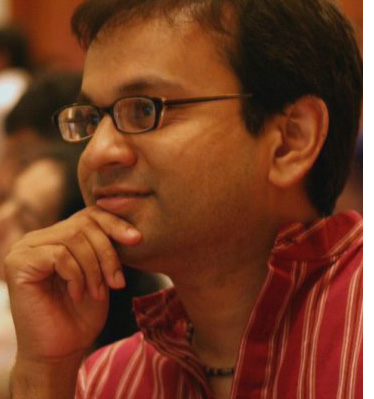
13 March 2013, Dhaka. The World Economic Forum (WEF) named Asif Saleh as one of its Young Global Leaders (YGL) of 2013 on 12 March 2013. The World Economic Forum, known for its annual meetings in Davos, is an independent international organization committed to improving the state of the world by engaging business, political, academic and other leaders of society to shape global, regional and industry agendas.
Asif Saleh joins 198 other young leaders from 70 countries under the age of 40 for their professional accomplishments and commitment to the society. These 199 honourees (42 percent of whom are women) come from all sectors, with half of them from business sector and the other half from arts and culture, academia, civil society, government, media and non-profits.
“The Forum of Young Global Leaders provides a unique effort to engage the younger generation into the management of global affairs, working together and being integrated into the larger forum community. The Young Global Leaders have an exceptional opportunity to improve the state of the world,” said Klaus Schwab, the founder and executive chairman of World Economic Forum.
Congratulating the senior director, BRAC's founder and Chairperson Sir Fazle Hasan Abed said, “It is a great achievement for Asif and BRAC and I believe it will enable him to amplify the voices of the marginalized community at the global dialogue”.
Mr. Saleh said he was humbled by the recognition and excited by the prospect of collaborating with other honourees in shaping the global policy dialogue by bringing the social, private and public sector together.
Drawing from a pool of several thousand candidates, the honourees were selected for their proven track record of leadership excellence, ability to overcome adversity and commitment to society. The selection committee of 2013 YGLs was chaired by H.M. Queen Rania Al Abdullah of the Hashemite Kingdom of Jordan.
The 2013 honourees will become part of the broader YGL community to turn their personal success into global significance by up-scaling ideas that lead to positive changes in societies.
Celebrating International Women’s Day 2013
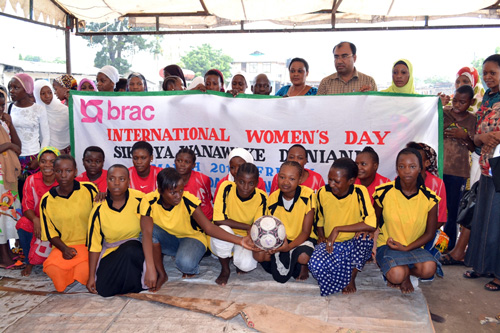
12 March 2013, Dhaka. On March 9, 2013 BRAC joined the international community to celebrate International Women's Day along with Samajik Protirodh Committee, a platform of 67 women and human rights organisations. A gathering and rally was held at the Central Shaheed Minar on the occasion. Rights activist Saheen Anam chaired the gathering; Chiroranjan Sarker of BRAC read the declaration of the programme, which was conducted by Rekha Chowdhury, the secretary of Bangladesh Mohila Parishad.
The committee placed a list of demands for women’s development including the increase in the number of reserved seat for women members in the parliament to one-third for the next two terms and direct election in those positions. Hence, areas for holding election have to be specified and the associated bill must be submitted in the current session of the parliament. There should also be arrangements for representation of the less fortunate groups of the society. Samajik Protirodh Committee will pursue their movement until these demands are fulfilled.
The declaration also demanded the amendment of the national constitution for fulfilling this goal. Ensuring one-third women’s participation in the political parties of the country has also become crucial as severe gender discrimination exists in political representation. The speakers noted that though women’s movement is growing worldwide, they still face discriminated and fall prey to violence in social, political and economic spheres. Emphasis was given on establishing constitutional paragraphs related to local government; women vice chairmen of the Upazillas should be allowed to participate in planning and development programmes to strengthen local government; an environment has to be created where indigenous people, differently able people, members of trans-gender group, religious minority groups along with women representatives elected in every level of local government can get the opportunity to perform their responsibilities in the parliament and local government structure. It is reiterated to reestablish secularism in the constitution like that of 1972. Other demands in the declaration include punishment to the war criminals of ’71; allocation of resources for specific responsibilities of women parliamentarians; establishing women’s equal rights in wealth and resources, implementation of CEDAW convention without any reservation etc. Above all, gender equality in the wages must be ensured in all sectors, be it formal or non-formal.
After the gathering, a procession was brought out from Shaheed Minar which finished at TSC of Dhaka University. Balloons decorated with slogan of women’s day were flown into the air from the base of the Shaheed Minar. BRAC goodwill ambassador, Wasfia Nazreen expressed her solidarity with the programme.
BRAC Organises Youth Cycle Rally in Celebration of the International Women’s Day 2013
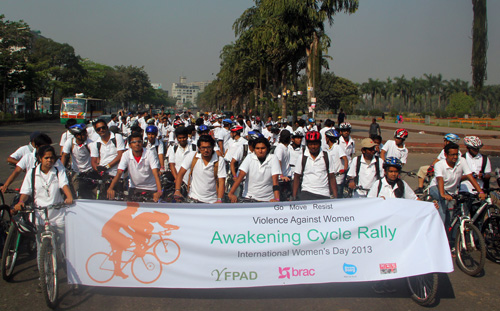
12 March 2013, Dhaka. BRAC’s gender justice & diversity programme(GJD), in association with Youth Forum Promoting Access to Development (YFPAD) jointly organised a youth cycle rally named “Awakening Cycle Rally”, in Dhaka as a part of celebrating International Women’s Day on 8th March, 2013. The rally started from Manik Miah Avenue at 9.30 am and ended at the Central Shahid Minar premise crossing Farmgate, Hotel Ruposhi Bangla, and the High Court. About 150 young cyclists, both male and female, participated in the rally.
Representatives of BRAC, YFPAD and cyclists expressed their opinions regarding gender issues on the occasion. They emphasised on involving youth to ensure safety and security of women and children among other things. “I intended to remove all the social barriers and to inspire other girls”, said a female cyclist about her cycle riding experiences in the city. A young man, about women rights, said, “We have a tendency to show sympathy to women, but this is not an issue of sympathy, this is their right”. “A cycle has two wheels and both are equal; if not equal, a cycle cannot run. Same thing can be told about society, it cannot run well if women and men are not equal”, said another male cyclist. At the end, certificates were distributed among all the cyclists who participated in the rally. Somoy Television was the media partner of this special event.
Every year BRAC organises different innovative events throughout the month of March to celebrate International Women’s Day such as this cycle rally.
For media coverage, please find the following link:
http://www.ittefaq.com.bd/index.php?ref=MjBfMDNfMDlfMTNfMV82XzFfMjQ2OTE=
Bangladesh’s agriculture industry needs farmer-friendly machineries: Matia Chowdhury
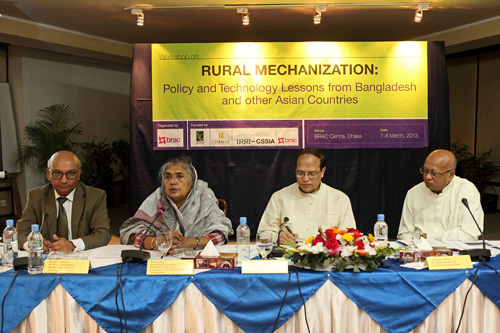
07 March 2013, Dhaka. Agriculture minister Matia Chowdhury on Thursday called on the scientists and manufacturers to produce farm equipments that are useful for Bangladesh’s small and medium scale farmers.
Addressing a workshop on the use of industrial machineries in crop production and processing in Bangladesh, held at BRAC’s head office on 7 March 2013, the Honorable Minister said machineries for managing large farms are unlikely to find market in Bangladesh, because the overwhelming majority of farmers are operating at small or medium scale. “You cannot compel farmers to use any machinery unless they find it truly useful,” she said.
BRAC and the Planning Commission of Bangladesh jointly organised this workshop as part of a two-day event titled ‘Asian Regional Workshop on Rural mechanisation’. The inauguration session was chaired by the governor of Bangladesh Bank, Dr Atiur Rahman, with the agriculture minister attending as the special guest.
In his chair’s address, Dr Atiur Rahman said that in the last four years the country’s foreign reserve increased from USD 6 billion to USD 14 billion. “The credit must go to the farmer community. It is because of their hard work that the production increased, and we did not have to import rice.”
Dr MA Sattar Mandal, member of the Agriculture, Water Resources and Rural Institution Division of the Planning Commission, presented a keynote paper titled ‘Rural Mechanisation: Status and Issues in Bangladesh’ at the inauguration. He chaired other sessions of the workshop along with Dr Shamsul Alam, member of GED of Planning Division and Dr Rafiqul Islam, director-general of Bangladesh Agricultural Research Institute. Professor Scott Justice of CIMMYT, Akhter Ahmed of IFRI, as well as BRAC’s executive director Mahbub Hossain and its research division’s director WMH Jaim also spoke at the workshop.
Celebrating one year of operation in Philippines
07 March 2013, Dhaka. Celebrating one year of operation in Philippines, BRAC is making progress towards reaching its goal of bringing the light of education in the troubled region of Muslim Mindanao. A year ago at the launching programme, BRAC’s founder and chairperson Sir Fazle Hasan Abed said, “What BRAC brings to the Philippines is not just an education delivery system but a vision of a just and fair society which is based on educating our children. It’s through this partnership of vision and action that can take the people forward. With the support of the Philippines Government and development partners, we are hopeful to make great progress with this challenging task at hand."
Public education in the ARMM faces a shortage of teachers. The drop-out rates for basic education are high, while the completion rate is low. These problems are particularly acute in the conflict-affected areas of Mindanao, where there are as many school-age children and youth who have dropped out of school as those who are still in school.
BRAC’s schools in ARMM are delivering education using a curriculum and instructional materials which were developed based on the Philippine’s standard proficiencies for pre- primary and elementary education, enhanced in the local cultural context. Complementing the work of the Department of Education in ARMM, BRAC is implementing its successful alternative schooling model which spread from Bangladesh to six other countries.
Inspired by the critical pedagogy of Brazilian educator Paulo Freire, BRAC schools offer a second chance to children to think for themselves at the primary and pre-primary level rather than relying on outdated systems of rote memorization. The schools are run with the active support and advice of the communities they serve, with schoolteachers chosen from among local women. With 1.1 million students enrolled as of 2012, BRAC is the world’s largest private, secular education provider.
BRAC launches its website in Bengali
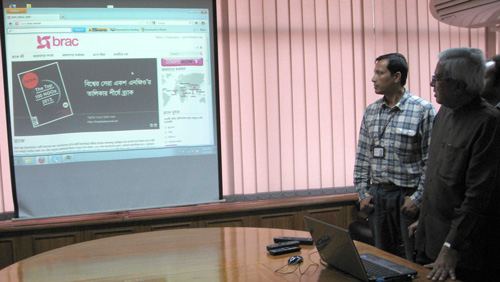
21 February 2013, Dhaka. BRAC is launching its very own Bengali website – www.brac.net.bd on the 21st February, 2013. BRAC Founder and Chairperson Sir Fazle Hasan Abed opened the website at the launching ceremony held at BRAC Centre.
Prominent media personality Shykh Seraj, BRAC’s Vice -Chairperson AMR Chowdhury, Sr Directors Babar Kabir and Asif Saleh were present at the event. The website is designed to create better access to information for a wider range of clients, partners, journalists and researchers in Bengali.
On explaining the purpose of the website the Chairperson said, “Our accountability is to the people of our country and this Bengali website will expand its reach to a wider range.”
The launching day of the website coincides with International Mother Language Day to commemorate the martyrs who fought for the right to speak in Bengali in 1952. To promote greater transparency and accountability for the people of the country, BRAC initiated the Bengali website to capture the spirit and essence of the International Mother Language Day.
The website provides in depth information about BRAC’s programmes in the areas of social and economic empowerment, education, health care, human rights, agriculture and food security, as well as environment sustainability and disaster preparedness among others, in Bangladesh and 10 other countries where BRAC operates.
The new Bengali website will operate simultaneously with the English website www.brac.net .
More...
Join the world’s biggest family




